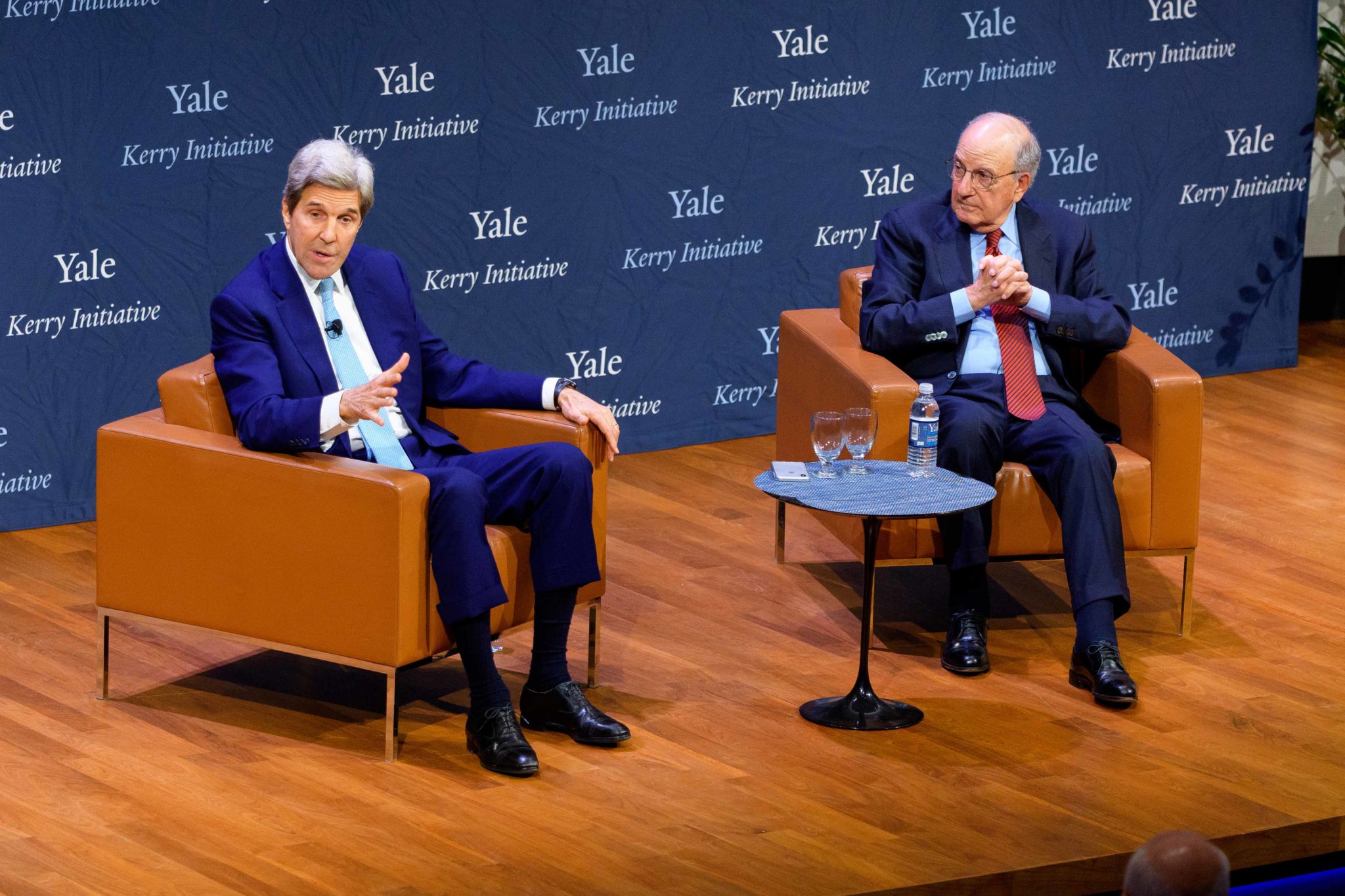
Courtesy of John Hassett
On Saturday, former Secretary of State John Kerry ’66 welcomed former Senate Majority Leader George Mitchell to the School of Management to discuss current American foreign policy issues and their respective diplomatic careers.
Kerry and Mitchell, both colleagues of the late President George H.W. Bush ’48 who passed on Friday, prefaced the conversation with reflections on the Yale alumnus. Though he stood on the opposite side of the aisle, Kerry lauded Bush as “the best of what public service and Yale produce.” Mitchell reflected on their shared love of Maine and the bipartisan efforts led by Bush and Mitchell that resulted in passing the Clean Air Act Amendments in 1990.
After introductions, Mitchell articulated his own concern for the state of contemporary domestic politics. He also argued that special interest groups and campaign finance Supreme Court cases, such as Citizens United v. FEC, will be recorded as some of the worst decisions in the nation’s history. Citizens United struck down federal prohibitions on federal campaign expenditures by corporations and unions.
“American politics is drowning in a sea of money, and it’s corrupting our society,” he said. “I’m going to demonstrate that corruption right now. How many of you believe that your representatives in Congress are more responsive to their constituents than they are to their donors?”
Mitchell, who was awarded an honorary degree from Yale in 2011 and represented Maine for 15 years, oversaw the passage of the Americans with Disabilities Act, the North American Free Trade Agreement and the establishment of the World Trade Organization. After his time in the Senate, Mitchell served as the independent chairman of the Northern Ireland peace talks, negotiations that culminated in the Good Friday Agreement that ended decades of violence between Ireland and Northern Ireland. He was awarded the Presidential Medal of Freedom and the United Nations Peace Medals.
Kerry, who is a distinguished fellow at the Yale Jackson Institute for Global Affairs, hinted at a potential presidential run last week at Harvard’s John F. Kennedy Jr. Forum. He made no mention of a potential presidential campaign at the talk.
Kerry asked Mitchell for his thoughts on the rise of populism as Presidents Xi Jinping of China and Vladimir Putin of Russia promote a narrative about the decline of “the liberal order of the West.” Mitchell answered that contrary to Trump’s stance on trade, the U.S. benefits from its alliances and trade agreements. Despite historical tumult in relationships, the U.S. also wishes the best for the people of China and Russia, he added.
“We are not opposed to China lifting millions into the middle class,” he said. “That’s a good thing. We are not opposed to Russians doing well. That’s a good thing. We seek to do that in a peaceful, rule-ordered way.”
Asked about his thoughts on Brexit, Mitchell responded that the Europeans’ disapproval of the United Kingdom’s referendum was understandable. He explained that if one’s partner of 30 years said he or she did not want to live with you anymore, one’s reaction would be just as harsh.
Mitchell also reflected on his own role in the negotiations during the Belfast Good Friday Agreement in 1998. Twenty years ago, the British government and Northern Irish politicians reached an agreement with the Republic of Ireland amid ongoing warfare. He added that the peace talks represented a model of conflict resolution for other countries.
Monica McWilliams, a former Northern Irish politician and an attendee of the talk, praised Mitchell for his role in the negotiations. McWilliams and Mitchell were featured as speakers in this weekend’s “Twenty Years of Peace” conference coordinated by the Poynter Journalism Fellowship.
“George Mitchell played a great role as a third party,” she told the News. “It tells you that in peace building, you need third parties. What he said was that the U.S. needs to play that role, and yet, many countries now are not accepting the U.S. as an impartial third party, which is really problematic.”
Makayla Haussler ’19 and Rohan Naik ’18 have been named Mitchell Scholars.
John Besche | john.besche@yale.edu







